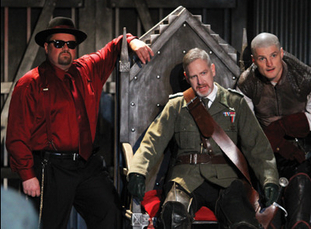King Henry V has died and left his eighteen month old son heir to the throne. All the powers around him vie for strength and influence.
Young Henry VI grows and, still at a very young age, leads his army into battle as England struggles to control France.
Gradually all the territory that King Henry V won is lost under France's leadership of Joan La Pucelle, the infamous Joan of Arc. Joan's powerful drive leads her forces to victory until she is eventually captured and burned at the stake.
King Henry VI sends the Earl of Suffolk to France where he falls in love with Margaret of Anjou. Already married, and thus unable to marry her himself, Suffolk arranges for Margaret to marry King Henry VI. Suffolk and Margaret become lovers and together plot to overthrow Gloucester and Winchester.
Meanwhile the Duke of York approaches the powerful and influential Earl of Warwick with his own claim to the throne. York and Warwick openly challenge the King's authority and civil war ensues. York's sons prevail and the oldest becomes King Edward IV.
In the interest of politics, Warwick begins to make plans for Edward IV to marry the French King's sister but Edward defiantly marries the beautiful widow Lady Elizabeth Grey. The dishonoured Warwick returns to Queen Margaret and the civil war continues. Warwick is eventually killed and Queen Margaret's forces are captured and King Henry VI en-prisoned.
King Edward IV's brother Richard kills the Queen and Henry VI's son Edward and the leaves to murder the ousted King Henry VI in prison. King Edward IV returns to the throne with his bride Elizabeth and celebrate the birth of their son. Richard then plots the demise of King Edward IV and the saga continues.
Director Christopher Weddell has made some interesting choices with his adaptation of this complicated story. Not all of them work but having said that, it's a difficult story to tell well. This needs to be noted.
Some of what stood out for this production was the set design. It was effective in its simplicity of metal and concrete. The music was appropriate and added a certain charm to the performances.
There were a few curious casting choices which unfortunately lead to laughter and disbelief of character at some of the most intimate parts of the play, when it was clearly not the intention.
A few mishaps from dropped lines, to one of the actors removing part of her costume before fully exiting the stage, to the graffiti lighting that didn't quite work, to the severed head that was blocked to be held within inches of the now newly attired actor who'd just finished playing that same decapitated soldier.
The costuming was odd to the point of distraction: there seemed to be no rhyme or reason to the outfits and they seemed to draw the audience's attention away from what was being said and become the main focus of the play.
There were a few notable Bard actors in this show, who were fabulous as usual, but it seemed that they were struggling to lift the pace and energy of the other performances as many of the portrayals fell flat and unsympathetic giving us no reason to care about them at all.
Overall, this was the first time a Bard performance truly didn't feel like it wasn't up to Bard standards: at least not yet. It was opening night. They have a long way to go still and a lot of time to get there. It's normal for nerves to be bad, mistakes to be made, cues to be missed.
There's still lots of potential for this show and for loyal Shakespearean enthusiasts plenty to keep them amused and interested.
It's a huge undertaking putting on a play like this whether you're in the director's chair or on the stage itself.
Check out BardontheBeach for tickets and times


 RSS Feed
RSS Feed
